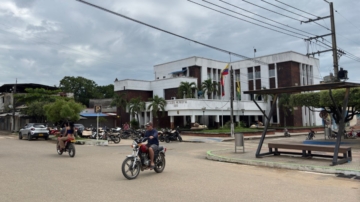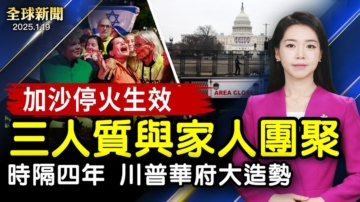【新唐人2012年3月12日讯】美国卡耐基梅隆大学的语言技术研究院(Language Technologies Institute at Carnegie Mellon)的数位学者做出一项研究,并发表在《新科学家》期刊上。研究深入观察了中国如何控制微博网站上的讨论,分析了6000万条微博信息,从中确定哪些话题是被禁的。研究发现,法轮功、人权以及艾未未等都是被禁的话题。国内学者表示,大陆网友已经习惯采取各种方式同审查者玩攻防战,最大限度的利用社交网络打破官方媒介的垄断,传播真实的心声。
美国学者的研究还发现中国的审查系统行动迅速,任何带有政治敏感性的词汇都会受到审查。大陆学者表示,微博管制,多集中在政治话题或者当局认为冲击政局稳定的公共事件和突发事件。
“中国社会科学院近代史研究所”研究员雷颐:“涉及到政治方面总体而言是比较敏感一点的。民生方面就比较宽松一点。”
大陆文化评论家叶匡政:“微博他的敏感词被禁,有一些是一直被禁的,类似像法轮功,六四这样一些目前明显是禁区的。另外每天他的敏感词在增加。比如王立军事件出来之后,网友议论一多,可能王立军就变成了敏感词。每一个热点事件如果影响到他们觉得大陆政治稳定的话,这都会成为敏感词。比如乌坎事件。”
受到官方审核的传统媒体曾经是中国民众获取消息的唯一渠道。但是自从有了微博这种社交网络,民众真实的心声获得了一个极好的释放和传播渠道,尽管发贴常常会“被敏感”被删除。网友们却各显神通,同审查者斗智斗勇。
大陆文化评论家叶匡政:“因为我们常年在这种敏感词被禁的环境,如果必须要发言的话,你也就只有适应这种方式。我相信经常玩微博的人可能都是这样,经常用旁敲侧击,或者可能还没有成为,比如王立军事件还没有成为敏感词的时候,就非常激烈的谈一谈。”
“中国社会科学院近代史研究所”研究员雷颐:“这个好像已经习以为常了。他删是他的,我们想办法说我们的。或者有的人采取中间加个点、加个星。”
叶匡政表示,微博这种新兴的网络社交工具对开启民智非常有好处。
叶匡政:“相对于这些体制内这些正规媒体、传统媒体来说,应该说微博释放了一个非常大的言论空间。比如说你不让我表达非常明晰的观点,我可以通过传播事实。我从我身边的家人,包括朋友使用微博的感受,很多过去思想比较保守的人,很多人都改变了目前对政府,或者对社会的态度。”
微博同时史无前例的给精英阶层和普通民众提供了亲密接触的机会。叶匡政指出,过去学者,知识份子和官员,跟民众的生活完全是隔离的。而微博为各个群体搭建了一个共同的平台,既让精英人士卷入到民众的言论空间,同时也让民众参与到很多重大政治话题,包括政治事件的讨论中。
新唐人记者秦雪、周天采访报导。
New Scientist On CCP’s Censorship Of Microblogs
Chinese Communist Party'(CCP) control over microblogs'
discussions was recently on focus by US scholars.
Experts from Carnegie Mellon’s Language Technologies
Institute published an article on the topic in New Scientist.
The researchers analyzed as many as 60 million posts
to verify those forbidden topics.
Not surprisingly, “Falun Gong", “Human rights,"
and “Ai Weiwei" are found to be on the filter list.
Chinese scholars remarked that the mainland netizens
are used to playing “letter games" against the censorship.
They are trying to spread the truth and their true thoughts
as much as they can, using the social networks.
US researchers have found that China’s censorship system
has a short response time.
Any word which is politically sensitive will be censored.
Chinese scholars reveal the controlled by CCP discussions.
They include political topics, public events or emergencies,
perceived by CCP as “threatening" to its “stability,"
Lei Yi (Researcher, Chinese Academy of Social Sciences):
"In general, political topics are always more sensitive than others, such as economy and livelihood."
Ye Kuangzheng (Cultural commentator,): “It’s almost known
to everyone, that some words are all-time banned, such as 'Falun Gong' and 'June Fourth Incident.'
On the other hand, the general list of forbidden words
is increasing day by day.
For example, the topic of Wang Lijun’s defecting became
hot online, thus 'Wang Lijun' might be added to the list too.
Every event CCP sees as a threat to its 'political stability,'
is regarded as sensitive, like the 'Wukan event'."
In the past, the strictly censored traditional media
were the only source for information for the Chinese people.
But as microblogs and other forms of social network emerge,
the Chinese found a very convenient way to communicate and express themselves.
Though the posts can be frequently deleted
by the censorship, the netizens never surrender.
They keep fighting back against the system,
using their courage and wisdom.
Ye Kuangzheng: “We live in a speech'censorship
environment all our lives.
Thus we have to get used to these ways of expression
when we have something to say.
I think every microblogger knows how to use a metaphor.
We also talk intensively before a word becomes sensitive."
Lei Yi: “We are used to such a life style.
They delete it using their ways, we talk using our ways.
For example, a widely used trick is to add a 'period'
or a 'star' between the characters."
Ye said that the social networks are very useful
in helping people free their minds.
Ye Kuangzheng: “Compared to the official or traditional
censored media, microblogs provide more speech' freedom.
For example, if making personal comments is not allowed,
I can spread some facts and truths instead.
Many of my family members and friends, including some
very conservative ones, have changed their opinions on the government or the society after using microblogs."
Furthermore, the microblogs unprecedentedly bring
the social elites and ordinary people close to each other.
Ye pointed that in the past the lives of scholars, intellectuals
and officials were completely separated from the civilians.
Now the appearance of microblogs provides
a common platform shared by all different groups.
The elites can learn how ordinary people think, and people
can publicly express opinions on political events or topics.
美国学者的研究还发现中国的审查系统行动迅速,任何带有政治敏感性的词汇都会受到审查。大陆学者表示,微博管制,多集中在政治话题或者当局认为冲击政局稳定的公共事件和突发事件。
“中国社会科学院近代史研究所”研究员雷颐:“涉及到政治方面总体而言是比较敏感一点的。民生方面就比较宽松一点。”
大陆文化评论家叶匡政:“微博他的敏感词被禁,有一些是一直被禁的,类似像法轮功,六四这样一些目前明显是禁区的。另外每天他的敏感词在增加。比如王立军事件出来之后,网友议论一多,可能王立军就变成了敏感词。每一个热点事件如果影响到他们觉得大陆政治稳定的话,这都会成为敏感词。比如乌坎事件。”
受到官方审核的传统媒体曾经是中国民众获取消息的唯一渠道。但是自从有了微博这种社交网络,民众真实的心声获得了一个极好的释放和传播渠道,尽管发贴常常会“被敏感”被删除。网友们却各显神通,同审查者斗智斗勇。
大陆文化评论家叶匡政:“因为我们常年在这种敏感词被禁的环境,如果必须要发言的话,你也就只有适应这种方式。我相信经常玩微博的人可能都是这样,经常用旁敲侧击,或者可能还没有成为,比如王立军事件还没有成为敏感词的时候,就非常激烈的谈一谈。”
“中国社会科学院近代史研究所”研究员雷颐:“这个好像已经习以为常了。他删是他的,我们想办法说我们的。或者有的人采取中间加个点、加个星。”
叶匡政表示,微博这种新兴的网络社交工具对开启民智非常有好处。
叶匡政:“相对于这些体制内这些正规媒体、传统媒体来说,应该说微博释放了一个非常大的言论空间。比如说你不让我表达非常明晰的观点,我可以通过传播事实。我从我身边的家人,包括朋友使用微博的感受,很多过去思想比较保守的人,很多人都改变了目前对政府,或者对社会的态度。”
微博同时史无前例的给精英阶层和普通民众提供了亲密接触的机会。叶匡政指出,过去学者,知识份子和官员,跟民众的生活完全是隔离的。而微博为各个群体搭建了一个共同的平台,既让精英人士卷入到民众的言论空间,同时也让民众参与到很多重大政治话题,包括政治事件的讨论中。
新唐人记者秦雪、周天采访报导。
New Scientist On CCP’s Censorship Of Microblogs
Chinese Communist Party'(CCP) control over microblogs'
discussions was recently on focus by US scholars.
Experts from Carnegie Mellon’s Language Technologies
Institute published an article on the topic in New Scientist.
The researchers analyzed as many as 60 million posts
to verify those forbidden topics.
Not surprisingly, “Falun Gong", “Human rights,"
and “Ai Weiwei" are found to be on the filter list.
Chinese scholars remarked that the mainland netizens
are used to playing “letter games" against the censorship.
They are trying to spread the truth and their true thoughts
as much as they can, using the social networks.
US researchers have found that China’s censorship system
has a short response time.
Any word which is politically sensitive will be censored.
Chinese scholars reveal the controlled by CCP discussions.
They include political topics, public events or emergencies,
perceived by CCP as “threatening" to its “stability,"
Lei Yi (Researcher, Chinese Academy of Social Sciences):
"In general, political topics are always more sensitive than others, such as economy and livelihood."
Ye Kuangzheng (Cultural commentator,): “It’s almost known
to everyone, that some words are all-time banned, such as 'Falun Gong' and 'June Fourth Incident.'
On the other hand, the general list of forbidden words
is increasing day by day.
For example, the topic of Wang Lijun’s defecting became
hot online, thus 'Wang Lijun' might be added to the list too.
Every event CCP sees as a threat to its 'political stability,'
is regarded as sensitive, like the 'Wukan event'."
In the past, the strictly censored traditional media
were the only source for information for the Chinese people.
But as microblogs and other forms of social network emerge,
the Chinese found a very convenient way to communicate and express themselves.
Though the posts can be frequently deleted
by the censorship, the netizens never surrender.
They keep fighting back against the system,
using their courage and wisdom.
Ye Kuangzheng: “We live in a speech'censorship
environment all our lives.
Thus we have to get used to these ways of expression
when we have something to say.
I think every microblogger knows how to use a metaphor.
We also talk intensively before a word becomes sensitive."
Lei Yi: “We are used to such a life style.
They delete it using their ways, we talk using our ways.
For example, a widely used trick is to add a 'period'
or a 'star' between the characters."
Ye said that the social networks are very useful
in helping people free their minds.
Ye Kuangzheng: “Compared to the official or traditional
censored media, microblogs provide more speech' freedom.
For example, if making personal comments is not allowed,
I can spread some facts and truths instead.
Many of my family members and friends, including some
very conservative ones, have changed their opinions on the government or the society after using microblogs."
Furthermore, the microblogs unprecedentedly bring
the social elites and ordinary people close to each other.
Ye pointed that in the past the lives of scholars, intellectuals
and officials were completely separated from the civilians.
Now the appearance of microblogs provides
a common platform shared by all different groups.
The elites can learn how ordinary people think, and people
can publicly express opinions on political events or topics.








